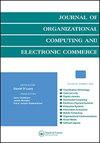Kernel naïve Bayes classifier-based cyber-risk assessment and mitigation framework for online gaming platforms
IF 1.9
4区 管理学
Q3 COMPUTER SCIENCE, INFORMATION SYSTEMS
Journal of Organizational Computing and Electronic Commerce
Pub Date : 2021-10-02
DOI:10.1080/10919392.2021.1987790
引用次数: 5
Abstract
ABSTRACT Recently, the number and intensity of cyberattacks against massively multiplayer online (MMO) gaming platforms have increased; up to 74% of distributed denial-of-service (DDoS) attacks on MMO gaming (MMOG) firms have been launched by hackers. These malicious attacks affect gamers’ experience and MMOG firms’ revenue model. Along with financial losses, MMOG firms’ reputation also suffers from these attacks. Therefore, in this study, we devised a framework to quantify and mitigate cyber-risk for MMOG firms using a hybrid learning method, namely, a kernel naïve Bayes classifier. Our kernel naïve Bayes classifier-based cyber-risk assessment and mitigation (KB-CRAM) framework included the DDoS attack traits. Subsequently, it outputs (i) the probability of DDoS attacks; (ii) the expected financial losses; and (iii) cyber-risk mitigation strategies, such as self-protection (technology, compliance, and legal deterrence), self-insurance, or cyber-insurance. Our study contributes to field-relevant literature by providing managers with a tool to improve game performance. This framework also suggests ways in which MMOG firms can hedge losses against repeated attacks from unethical hackers.Kernel naïve基于贝叶斯分类器的网络游戏平台网络风险评估与缓解框架
近年来,针对大型多人在线(MMO)游戏平台的网络攻击数量和强度有所增加;针对MMO游戏(MMOG)公司的分布式拒绝服务(DDoS)攻击中,有74%是由黑客发起的。这些恶意攻击会影响玩家的游戏体验和MMOG公司的盈利模式。除了经济损失,MMOG公司的声誉也受到这些攻击的影响。因此,在本研究中,我们设计了一个框架,使用混合学习方法,即核naïve贝叶斯分类器,来量化和减轻MMOG公司的网络风险。我们的内核naïve基于贝叶斯分类器的网络风险评估和缓解(KB-CRAM)框架包括DDoS攻击特征。随后输出(i) DDoS攻击的概率;(二)预期的经济损失;(iii)网络风险缓解策略,如自我保护(技术、合规性和法律威慑)、自我保险或网络保险。我们的研究通过为管理者提供一种提高游戏表现的工具,为相关领域的文献做出了贡献。该框架还提出了MMOG公司可以对冲损失的方法,以防止不道德黑客的反复攻击。
本文章由计算机程序翻译,如有差异,请以英文原文为准。
求助全文
约1分钟内获得全文
求助全文
来源期刊

Journal of Organizational Computing and Electronic Commerce
工程技术-计算机:跨学科应用
CiteScore
5.80
自引率
17.20%
发文量
7
审稿时长
>12 weeks
期刊介绍:
The aim of the Journal of Organizational Computing and Electronic Commerce (JOCEC) is to publish quality, fresh, and innovative work that will make a difference for future research and practice rather than focusing on well-established research areas.
JOCEC publishes original research that explores the relationships between computer/communication technology and the design, operations, and performance of organizations. This includes implications of the technologies for organizational structure and dynamics, technological advances to keep pace with changes of organizations and their environments, emerging technological possibilities for improving organizational performance, and the many facets of electronic business.
Theoretical, experimental, survey, and design science research are all welcome and might look at:
• E-commerce
• Collaborative commerce
• Interorganizational systems
• Enterprise systems
• Supply chain technologies
• Computer-supported cooperative work
• Computer-aided coordination
• Economics of organizational computing
• Technologies for organizational learning
• Behavioral aspects of organizational computing.
 求助内容:
求助内容: 应助结果提醒方式:
应助结果提醒方式:


